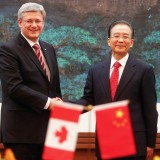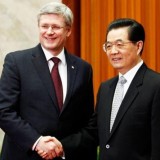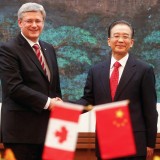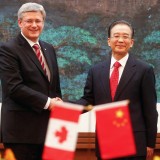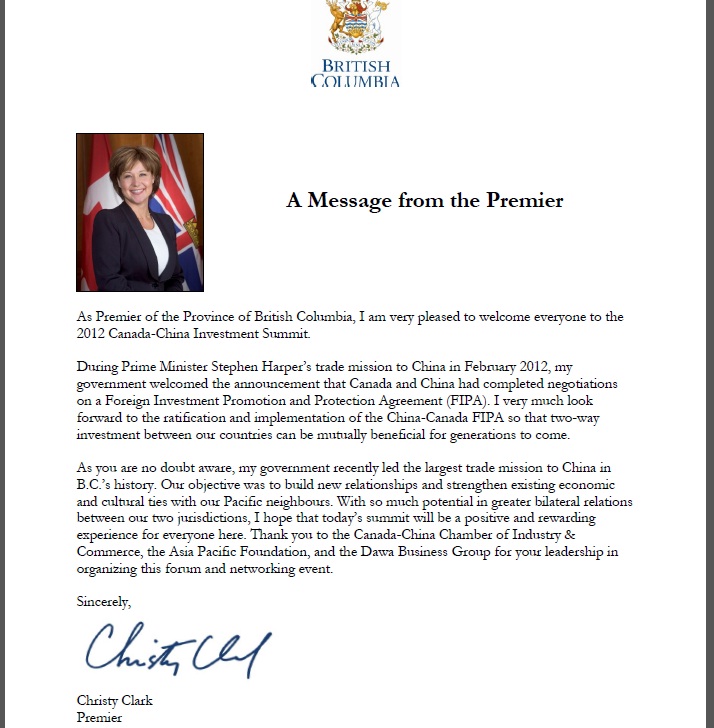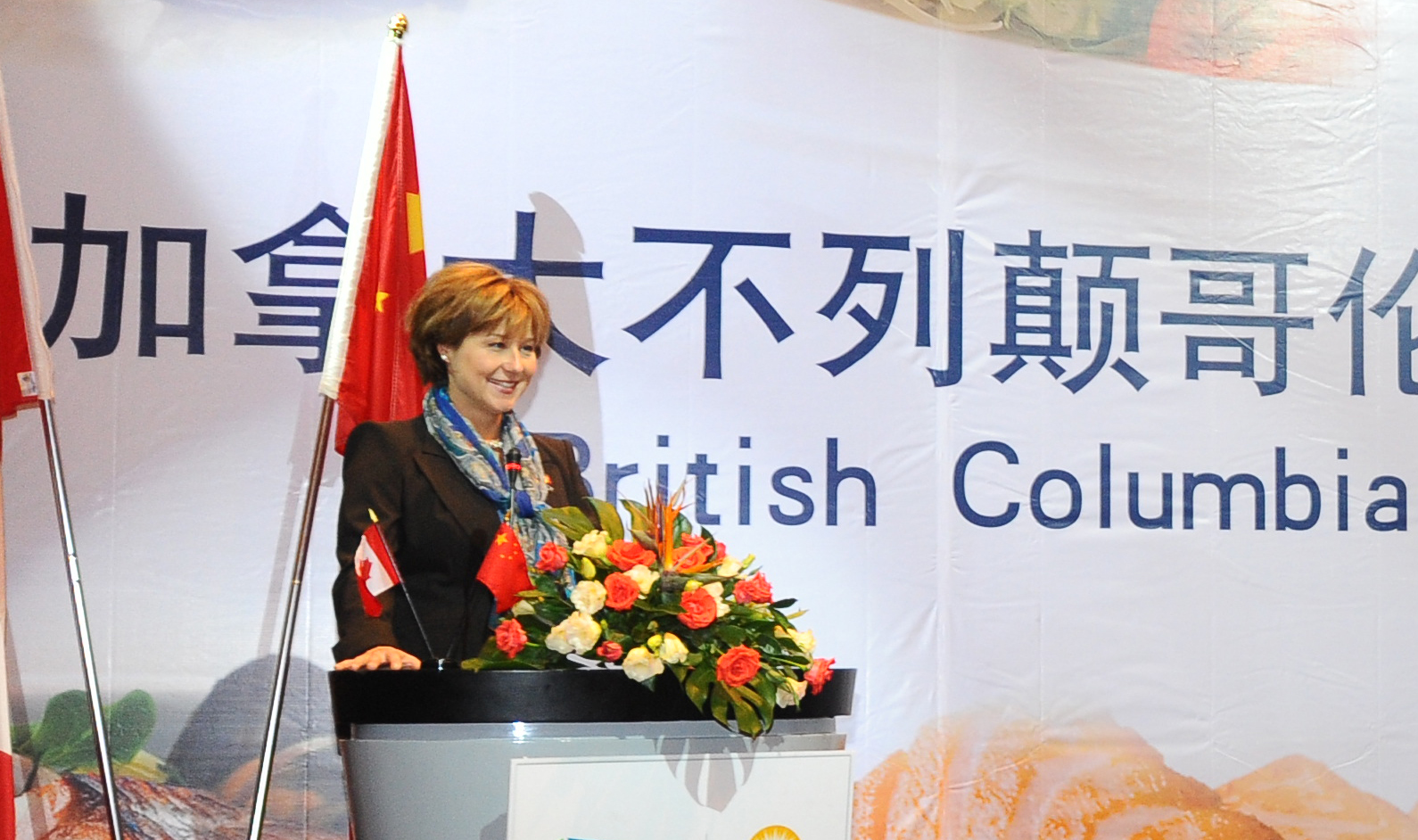IMPORTANT UPDATE TO FIPA STORY: Public Comment Window Still Open for Canada-China Trade Deal Environmental Assessment. Learn how to officially register your concerns with FIPA here.
————————————————————-
An in-depth, out-of-the-box, common sense analysis and discussion paper issued on the day of the expected FIPA ratification.
Since May of this year we here at the Common Sense Canadian have been uncovering the behind-the -scenes legal and administrative practices undertaken by governments and industry collaborators to ensure the success of the oil and gas agenda.
Starting with “The Myth of BC Liberal Neutrality on Enbridge”, we have meticulously uncovered details of behind-the-scenes agreements that have seen British Columbia’s elected officials surrender our sovereignty, abandon our jurisdiction and capitulate to the mega-oil and gas agenda. All of which was done in silence, with the governments responsible boosted by organizations mandated to involve themselves in public processes on behalf of British Columbians to protect our rights and further our interests.
Over the past month we have seen an incredible flurry of concern arise from the Harper Government’s move to ratify the Chinese FIPA (Foreign Investment Promotion and Protection Agreement). However much of the consternation expressed has not focused on the fact that this agreement is 15 years in the making and has involved the same players responsible for ensuring the success of behind-the-scenes agreements like the Equivalency Agreement of June 2010 between the Governments of BC and Canada.
Starting in 2001, FIPA laid out a Framework for the Environmental Assessment of Trade Negotiations, which resulted in a myriad of activities and outreach to stakeholders, many of which where the same stakeholders whom must have been consulted in the similar overlapping process which resulted in the Equivalency Agreement.
The Environmental Assessment (EA) component of the Chinese FIPA was sparked in 1998, however this detailed framework led to a process that spanned over a decade, but more specifically negotiations were “re-launched in 2004” and were “expected to successfully conclude in 2008.” And just like the 2010 Equivalency Agreement, the FIPA environmental assessment component included an open invitation for a “30 day time period for input from stakeholders and the general public” which occurred between February 20 and March 21, 2008 at the end of the multi-year FIPA EA consultative process dictated by the framework linked to above and detailed on that website.
In fact, the entire Chinese FIPA Environmental Assessment component included three phases, which were designed for transparency and broad input – here is the exact text:
Three phases of assessment are generally undertaken: the Initial, Draft, and Final EA. These phases correspond to progress within the negotiations. The Initial EA is a preliminary examination to identify key issues. It occurs earlier on in the negotiations. The Draft EA builds on the findings of the Initial EA and requires detailed analysis. A Draft EA is not undertaken if the negotiation is not expected to yield large economic changes. The Final EA takes place at the end of the negotiations. At the conclusion of each phase, a public report is issued with a request for feedback.
“Negotiations, Correspondence, Public Reports” and “Requests for Feedback” were all an integral part of the multi-year Environmental Assessment Process enabling the FIPA agreement, yet few of us heard anything about it and no doubt average Canadians were completely unaware.
This process also included outreach to specific groups – again, here is the text from the government website:
4. Invitation to Submit Comments In keeping with the Framework, an Environmental Assessment Committee (EAC) has been formed to undertake the analysis of the Canada-China FIPA. Coordinated by the Department of Foreign Affairs and International Trade Canada, the Canada-China FIPA EAC includes representatives from other federal government departments, including Environment Canada, the Canadian Environmental Assessment Agency, and Natural Resources Canada, and is formally chaired by the lead negotiator for the agreement. An important responsibility of the EAC is to gather input from provinces and territories, stakeholders representing business, academics, and non-governmental organizations, as well as the general public.
As part of its commitment to an open and transparent process, the Government has opened this Initial EA for public comment from February 20, 2008 to March 21, 2008. Feedback on the likely economic effects and the likelihood and significance of resultant environmental impacts is especially welcome, including ways in which the GoC’s current analysis could be strengthened. It is important to keep in mind that the assessment is focused on the possible positive and negative environmental impacts in Canada.All feedback received is documented in keeping with the guidance contained in the EA Handbook, and circulated to the EAC. It will inform the Final EA of the Canada-China FIPA, as well as ongoing EA work within the Government of Canada. (emphasis added)
Please take the time to visit the link this text has been taken from as it explains in exhaustive detail the Environmental Assessment’s “Open and Transparent” Process required to enable FIPA and the way in which the process was conducted. Furthermore, it outlines in detail how Environmental Non Government Organizations (ENGOs) were solicited for input as key stakeholders in the FIPA process.
Once again, as with the June 2010 Equivalency Agreement, we are learning after the fact that our sovereign rights, interests and ability to exert jurisdictional control and decision making over our land and water are being quietly abandoned without our knowledge and seemingly behind closed doors.
This is once again occurring despite the fact that ENGOs, remunerated by governments to participate in Environmental Assessments and related processes, have mandates that read like this one from a prominent BC ENGO known as the Dogwood Initiative, whose organization has been at the forefront of the high profile tanker and pipeline issues unfolding in British Columbia for several years now:
Everything we do is about giving British Columbians ways to take back decision-making power over their land and water. Right now, 96 per cent of British Columbia’s land is owned by the people, but 88 per cent of that land is controlled by large timber, mining and oil companies. That stinks.
We believe British Columbians should have the right to make their own decisions about how the land they live on is used and we know that there is power in numbers. That’s why we work with more than 100,000 supporters, as well as First Nations, businesses and communities, to leverage political victories and find common sense solutions to some of B.C.’s most pressing problems.
Ultimately responsible for these unseemly agreements are our elected leaders like Allison Redford and yet-to-be-elected Premier Christy Clark who have continued the very public bun fight over who gets what – and in so doing Redford maintains her appointed role as the front-woman for the Energy Policy Institute of Canada (EPIC) energy strategy, while Clark simply works to cling to power.
However, it is becoming crystal clear that the strategy to massively escalate oil and gas exploitation and liquidation was in the can long ago, just like Minister of Natural Resources Joe Oliver recently exclaimed in a story entitled, “No need for a National Energy Strategy”:
Oliver said Tuesday he has spoken with Alberta Premier Alison Redford on a number of occasions about her plans for a National Energy Strategy. But he said as far as he could tell, Redford mentioned nothing in their conversations that his government wasn’t already covering
“[But] if you want to put a bow on it and call it a National Energy Strategy, go ahead,” Oliver said at the closing news conference of the Energy and Mines Ministers’ Conference in Charlottetown, P.E.I.
Indeed, all Clark and Redford seem to be fighting over is what colour bow to put on a now longstanding and complete capitulation to the oil and gas industry and its EPIC agenda. As Rafe Mair outlined in his recent column, the BC Liberal government was admittedly consulted throughout the 15-year Chinese FIPA negotiation period – all Provinces and Territories were (as linked to and outline above).
And they have not only quietly ushered it in, but they are also boosting it at high level international investment summits and overseas junkets to the new BC government Shanghai Office. As Rafe points, out doing so has virtually removed any legal ability for Provinces to reclaim their sovereignty and push back on the Federal Government and the FIPA deal.
It is therefore no wonder why they have boosted the FIPA deal at high-level investment meetings, while resisting pushing it in the media, which has worked to keep the 15 year process away from prying eyes, such as those of local blogger and professionally trained researcher Laila Yuile. Ms. Yuile, has distinguished herself among the BC blogosphere as an astounding researcher with impeccable journalistic integrity. She has made the China file her hobby horse for quite some time now and recently felt compelled to apologize for not being aware of FIPA and issues related to the BC Government. All of which attests to the strategically stealthy component of the British Columbian collaborators on FIPA. If this stuff got by Laila, then you can rest assured very few observers, if any, know of these important issues in the entire Province.
That said, key environmental stakeholders canvassed to be involved are defined as “a very important aspect” of the FIPA process. The Environmental Assessment component, as I touched on above, seems to be one of the most exhaustive components according to the government website. Indeed, the process and its vast implications, of which I formally wrote about in detail at another fine BC political blog, are immense and far reaching.
For instance, in that piece, I mention the fact that Harper’s gutting and rewriting of the entire legislative framework pertaining to environmental regulations and processes will be locked in for as long as 31 years and applicable to any Chinese investments occurring after this agreement is ratified. Remember, during the CNOOC/Nexen review it was widely reported that the “we ain’t seen nothing yet”, as that deal only marked the opening of the Chinese investment floodgates into the oil and gas sector.
Moreover, the Chinese FIPA involved exhaustive and pivotal processes spanning 15 years, resulting in the development of numerous environmental Memorandums of Understanding (MOUs) on matters related to protected areas, cooperation on climate change and many on “environmental cooperation”, which included the “building of partnerships and facilitation of dialogue among environmental protection agencies, organizations and enterprises in both countries.”
While the EA framework for FIPA was established in 2001, the international environmental undertakings began in 1998, however these Bilateral Trade Agreements (FIPAs) were largely left dormant as relics of the past when Canada had struck deals in the 80s and 90 with mostly underdeveloped countries.
However, after globetrotting international financiers who stick-handle trade agreements suffered the very public death of the Multilateral Agreement on Investment (MAI), a renewed strategic focus was born on bilateral agreements done in a stealth-like, one-off fashion.
This was apparently appealing to David Emerson, who entered the fray after crossing the floor to be Minister of International Trade and Minister for the Pacific Gateway (before returning to the private sector to work for the China Investment Corporation.) In 2004 he eagerly went to work slam dunking FIPAs, and attempted to complete 4 during his time in office, ranging from little one-offs with minor countries like Peru to larger emerging economies like India.
However, his crowning achievement was the Chinese FIPA, which he kicked into high gear claiming it to be his “Ultimate Goal”, as published in the Chinese in Vancouver blog at the time. Once again these deals were left largely unreported in the mainstream media, and even the Chinese in Vancouver blog stated that Emerson’s “in camera” meetings had the opposition NDP complaining how hard it was to get “details”.
However, the blog did publish all the details of an exhaustive FIPA-related agenda dictated by the Chamber of Commerce, who were among NGOs and governments solicited by the FIPA process, all of which of course has been accomplished and will be complete if FIPA is indeed ratified.
Emerson, who wrote the forward to a Fraser Institute study on FIPA, used his history of “public service” as a catalyst to establish EPIC, which has been busy rewriting the entire legislative framework for oil and gas development ever since. Everything EPIC published was subsequently contained in Harper’s Omnibus bills while he positioned his huge corporate coalition as the chief architects of Canada’s new “National Energy Strategy.”
More recently a key British Columbia-based organization from Emerson’s hometown was invited into his EPIC National Energy Strategy at a kick-off meeting in Alberta. Tides Canada, who also established a loose coalition of over 150 endorsers for their strategic tome entitled, “A New Energy Vision for Canada”, laid out their vision within the EPIC strategic framework with the backdrop of the scenic Kanaskis mountain range, away from peering eyes and protests – and among governments and oil and gas industrialists, while along side Emerson and his EPIC directors.
Tides is headed up by Joel Solomon, infamously depicted as the “Greenfather” and a shrewd “business first socialist”, who is the funding engine behind most all of British Columbian Environmental Organizations (ENGOs), and of course two-term Mayor of the world’s “Greenest City”, Gregor Robertson.
Solomon’s labyrinth of foundations, investment companies and network of “social entrepreneurs” and activists spawned the internationally renowned “Green Think Tank” known as Hollyhock, which led to the development of Hollyhock Leadership Institute among myriad other well-resourced and connected organizations which have become the commanding heights of green, socially responsible development as well as the strategic headquarters for the “Greening the Oil Sands” initiative being communicated through the well-known internet E-zine The Tyee and supported by the online publication more intimately connected to Solomon, the Vancouver Observer.
All of these developments occurred during the course of the exhaustive and far-reaching FIPA Environmental Assessment process and much, much more. During this time we also saw other major achievements in the oil and gas legal and administrative agenda. TILMA (the Trade, Investment and Labour Mobility Agreement) was negotiated and then established in 2006, with barely a whimper from the environmental community, when the BC Liberals invoked closure to ram it through – despite the vast implications for oil and gas developments and the provincial sovereignty that agreement left in an abandon pile on the negotiating room floor.
Then there was the incredible, inconceivable BC Liberal move that spawned the Equivalency Agreement in June of 2010, which iced the cake for the oil and gas lobby. This agreement, done away from the limelight and while the government responsible was being celebrated for a Clean Energy Climate Change Strategy – and lauded by the environmental community – saw BC forfeit its last vestige of sovereignty and jurisdictional control by giving up any and all decision-making capacity on four major oil and gas projects in BC’s north, including the Enbridge Northern Gateway Pipeline. Amazingly, this agreement was implemented by senior staff and not the minister responsible, as the law dictates.
Each one of these far reaching and legally binding agreements would have involved BC stakeholders at all levels, but ENGOS in particular would have been solicited for serious roles as precisely outlined in the FIPA EA framework linked to above. Both the FIPA EA and June 2010 Equivalency Agreement involved a 30-day time period for broad stakeholder commentary, advertized in the Canadian Gazette – a process intimately familiar to British Columbian ENGOs.
When one considers each one of these separately, they appear relatively reasonable and were communicated as if they had little if anything to do with the oil and gas agenda and ultimately were pitched as integral to ensuring an investment climate that would grow our economy. However, after a closer look we learn that the exact opposite is the case. Indeed, these three agreements completely wrap up most every aspect of oil and gas development related to our jurisdiction and leave British Columbians in the cold as virtual bystanders, literally legally stranded as voiceless squatters on their own land.
TILMA
- Works from “the bottom up” versus “the top down” approach the FIPA trade agreement employs – dovetailing nicely
- Ensures no level of government can create trade obstacles on or “through” their jurisdictions – doing so results in penalties up to 5 million per infraction
- Ensures free flow of “investment” throughout the jurisdictions of all levels of government
- Ensures the free flow of labour for all oil and gas projects
- Involves a myriad of other details related to labour mobility, Trade and Investments
- Was ushered in to law by BC liberals, who invoked closure
- Recently updated and renewed as NWPA
FIPPA
- Locks in complete legal framework ushered in by Harper for a generation
- Negates any future changes to environmental protection or processes
- Locks in Royalty Regimes for a generation
- Negates future governments from making any changes
Equivalency Agreement
- Forfeits BC’s sovereignty and decision-making capacity
- Involves four major oil and gas projects including Enbridge NGP
- Negates jurisdiction over land and water
Indeed it would seem that Minister Oliver was exactly right and boldly honest as all Clark and Redford are fighting over is the colour of the bow on the now longstanding strategy for massive escalation in the exploitation and liquidation of Canada’s oil and gas resources. The detailed terms in these three agreements leave British Columbians with little if anything else to decide. This is especially true when you consider reams of other supporting agreements like temporary foreign worker legislation and myriad other streamlining legislation which works to sideline all levels of government in deciding the fate and from of major developments slated to occur in British Columbia.
Further to this mind-blowing array of far-reaching, long-lasting, legally-binding policies riddled with serious implications for British Columbia, the Canada-Chinese FIPA also involved a detailed outreach effort to international investment and environmental organizations, resulting in The Canada-China Climate Change Working Group which was formed in March 2004, as a follow up to the Canada-China Joint Statement on Climate Change Cooperation. The Working Group co-ordinates and advances the bilateral effort to respond to climate change.
Other joint efforts include The Framework Statement which created the Canada-China Joint Committee on Environment Cooperation (JCEC) with Environment Canada and the Chinese State Environmental Protection Administration (SEPA) as the lead agencies. All of which started when Canada and China signed the “Canada-China Framework Statement for Cooperation on Environment into the 21st Century” during Premier Zhu Rongji’s visit to Canada in November 1998.
All of this, while substantial, is not the entirety of the FIPA Environmental Assessment component which was supposed to be released when the FIPA agreement was complete, however Stephen Harper signed the agreement almost six weeks ago and the final Environmental Assessment reporting which enabled FIPA seems absent.
Its absence may be a result of this bombshell directly from the Government’s FIPA EA report:
6. Stakeholder Feedback
The notice of intent to conduct an EA of the Canada-China FIPA was in the Canada Gazette on November 5, 2005. The notice included an invitation to interested parties to submit their views on the likely environmental impacts of the Canada-China FIPA on Canada. There were no comments received on the Notice of Intent. (emphasis added)
8. Conclusion and Next Steps
Canada’s Framework for Conducting EAs of Trade Negotiations calls for national assessments and allows for consideration of transboundary, regional, and global environmental impacts if they have a direct impact on the Canadian environment. However, it is outside of the scope of this study to assess the potential for positive or negative environmental impacts that could occur in China because of these negotiations, or to judge the measures in place within China to enhance or mitigate such impacts.
Investments in sectors of interest to China may have an impact on the environment. However, the impact would be the same whether the investment is made by a Chinese investors or a domestic investor. In addition, investors, whether they are Canadian or foreign, are bound by environmental protection regulations and projects resulting from these investments are subject to applicable environmental assessment legislation. (that is the same legislation Harper just gutted and rewrote)
The Initial EA of the Canada-China FIPA concludes that significant changes to investment in Canada are not expected as a result of the Canada-China FIPA negotiations as there are no specific investments known to be dependent on the FIPA’s conclusion or no direct known causal links between FIPAs and expansion of investment. As such, the environmental impacts on Canada are expected to be minimal.
The Initial EA will be circulated to decision makers to inform the conclusion of the Canada-China FIPA negotiations as well as other policy development activities.
Following the receipt of public comments on the Initial EA, the Final EA will be completed taking into account the consultative findings. In the light of the Initial EA’s conclusions regarding the unlikelihood of significant economic activity and environmental impacts in Canada, preparation of a Draft EA is deemed to be unnecessary. The Final EA will coincide with the conclusion of the Canada-China FIPA negotiations. (emphasis added)
Did you catch that? That underlined bit.
No specific investments known to be dependent on FIPA’s conclusion? Nor do they believe there are any links between FIPA and the expansion of investment!
Then what did we do it for and why was it Emerson’s “Ultimate Goal?”
And then the kicker: “In the light of the Initial EA’s conclusions regarding the unlikelihood of significant economic activity and environmental impacts in Canada, preparation of a Draft EA is deemed to be unnecessary.”
This stuff is incomprehensible! Due to a complete lack of input from the environmental side of the equation or any submission of appropriate analysis, the Federal Government has concluded that there will be no significant impacts on our environment as a result of hundreds of billions of dollars invested in Canada’s oil and gas industry.
And how does it all square with Harper’s election campaign platform? Here is a snippet from his Energy Platform:
Prohibiting the Export of Raw Bitumen to Higher Polluting Jurisdictions
A re-elected Conservative Government led by Stephen Harper will prevent any company from exporting raw bitumen (unprocessed oil from the oil sands) outside of Canada for upgrading in order to take advantage of lower pollution or greenhouse gas emissions standards elsewhere.
In conclusion, we have to consider very important impacts that are solidified as a result of the overlapping trade agreements coupled with the forfeiting of British Columbia’s sovereignty which demonstrate the green failing on FIPA is less about the environment and more about the cash. This is true as a result of two easy-to-comprehend concepts which are definitive. You cannot change the rules of the game after the investment has occurred and doing so will result in being sued. These notions run through all trade agreements and are at the very heart of the purpose of the FIPA.
- Less about the Environment: The wholesale environmental and legislative changes authored by EPIC and ushered in by the Harper Government rewrite the entire legal framework for oil and gas development. As a result of ratifying FIPA on the heels of these changes, each and every future investment in the industry in Canada is therefore guaranteed under these terms for thirty years and many subsequent governments. If however, a subsequent government decides to restore any one of the rollbacks of the Harper government they will be sued under these agreements. If they decide to scrap the FIPA altogether they must give at least one year notice, and each and every investment that occurred during the time FIPA was ratified, will be protected automatically for an additional 15 years upon the revoking of FIPA and all of the existing legislative framework will apply for that time. And, once again, if subsequent changes are made, lawsuits will result reaching into the millions, if not billions. All of which locks in the gutting of environmental legislation and processes that have occurred thus far for a generation as making any changes is too punitive.
- More about the Cash: The very same dynamics described in detail above apply to royalty regimes at all levels of government. Currently, oil and gas royalty regimes in Canada are some of the lowest in the world. FIPA locks in those rates for a generation or more and, once again, if any subsequent government wishes to adjust the rates to harmonize them with other jurisdictions – say, like those of oil producing countries in Africa who have recently struck deals with the same major oil companies operating in Canada – that involve Production Sharing Agreements (PSAs) which reach as high as 75% of total production being steered to public coffers, we will be sued for doing so and it will involve “forecasts of lost profits” which could range into the hundreds of billions, effectively destroying any potential whatsoever of altering royalty regimes away from being the lowest anywhere in the world. Moreover, Chinese companies are not just investing in production and market potential but rather are purchasing companies outright making our exposure to being sued for profit potential enormous. In the final analysis, this agreement is all about the cold, hard cash because even if we never are sued, FIPA ensures profiteering for anyone investing under the terms it dictates, the likes of which is unparalleled anywhere else in the world. It is important to remember that at current royalty rates, both BC and Alberta are filing huge deficits. And Canada itself has filed over 125 billion dollars in deficits just since 2008, meanwhile the Tar Sands peaked to its highest production rates in 2010 the same year Harper filed the country’s largest deficit in history. Clearly, adjusting some of the lowest royalty rates in the world is required to pull Canada out of the fiscal fire and attempt to return to balanced budgets.
Regardless of what seems to be total insanity as we explore the details of FIPA and supporting agreements. It is important to go through such great lengths and review all of these painstaking details in order to understand how and why it is most Canadians, and British Columbians in particular, where not aware of this agreement.
There was very little mainstream coverage and negotiations seemingly took place out of the public eye and away from the scrutiny of the media. Intentional or otherwise, it has left Canadians very vulnerable. Maybe they believe this agreement means nothing and has no impacts, as this report says, but as is clearly outlined here that is definitely not the case. And it clearly was the National Energy Strategy’s chief architect David Emerson’s “ultimate goal” for a reason.
Fortunately, some civil society organizations and (NGOs) made the effort to warn Canadians early on, despite not being engaged in the process in any way, or solicited directly for their input. That list includes groups like Canada’s Coalition to End Global Poverty, who produced this handy must read handbook entitled, Bilateral Investment Treaties: A Canadian Primer that works to hit the high points of these agreements and their immense implications, including the impacts on sovereignty, the environment and the economy. There were also independent, uninvolved, unsolicited lawyers who have drawn up abstracts which really work to inform Canadians. And the Council of Canadians jumped on FIPA as soon as it came to their attention in September.
In the end, it is difficult if not impossible to conceive how the FIPA’s pivotal and enabling environmental assessment process, spanning 15 years, received little if any attention. And it is impossible to understand how an Environmental Assessment involving legislated outreach to stakeholders as an important and pivotal aspect to the success of the agreement garnered “no comments” over a month-long input period at the end of a multi-year process – resulting in conclusions that there was little if any environmental impact, despite the obvious, far -eaching impacts explained here and elsewhere.
The FIPA EA resulted in multiple memorandums of understanding, the establishment of multiple joint international committees, in addition to policy certainty and harmonization. Cooperation on Climate Change initiatives and the list goes on and on, yet somehow all this escaped the lead environmental organizations in British Columbia who are mandated to represent our interests while protecting and furthering our jurisdictional and legal rights.
The lawyers who lead the ENGOS on the forefront of tankers and pipeline issues who signed up thousands for the Enbridge Environmental Assessment alone while undertaking a media campaign spanning years, were somehow unable to comment on, involve themselves in, or write as much as one press release in regard to the FIPA EA since its inception 15 years ago which, when in effect, locks in Harper’s gutting of environmental standards for any all Chinese investments now and for thirty years into the future.
To top it all off we learn of all this AFTER the agreement is signed by the Prime Minister and mere months after we first heard that as far back as June 2010, BC gave up its right to its own Environmental Assessment to decide on four major oil and gas development projects, including the Enbridge Northern Gateway Pipeline Project. Which was accomplished through the establishment of a “secret” equivalency agreement that saw us abandon our sovereign rights and legal jurisdiction in a process that also had been advertised in the Canadian Gazette and involved a month-long period for input from stakeholders. But, once again, the ENGO community who is mandated and remunerated to be involved in these processes said and did nothing.
Adrian Dix stood up for BC and made the move to restore our sovereignty by pledging to revoke the Equivalency Agreement within one week upon being elected.
It is time for all Canadian citizens to stand up and pledge to do whatever it takes to prevent FIPA from being ratified tomorrow or ever.
Its time to stand on guard for Canada!



